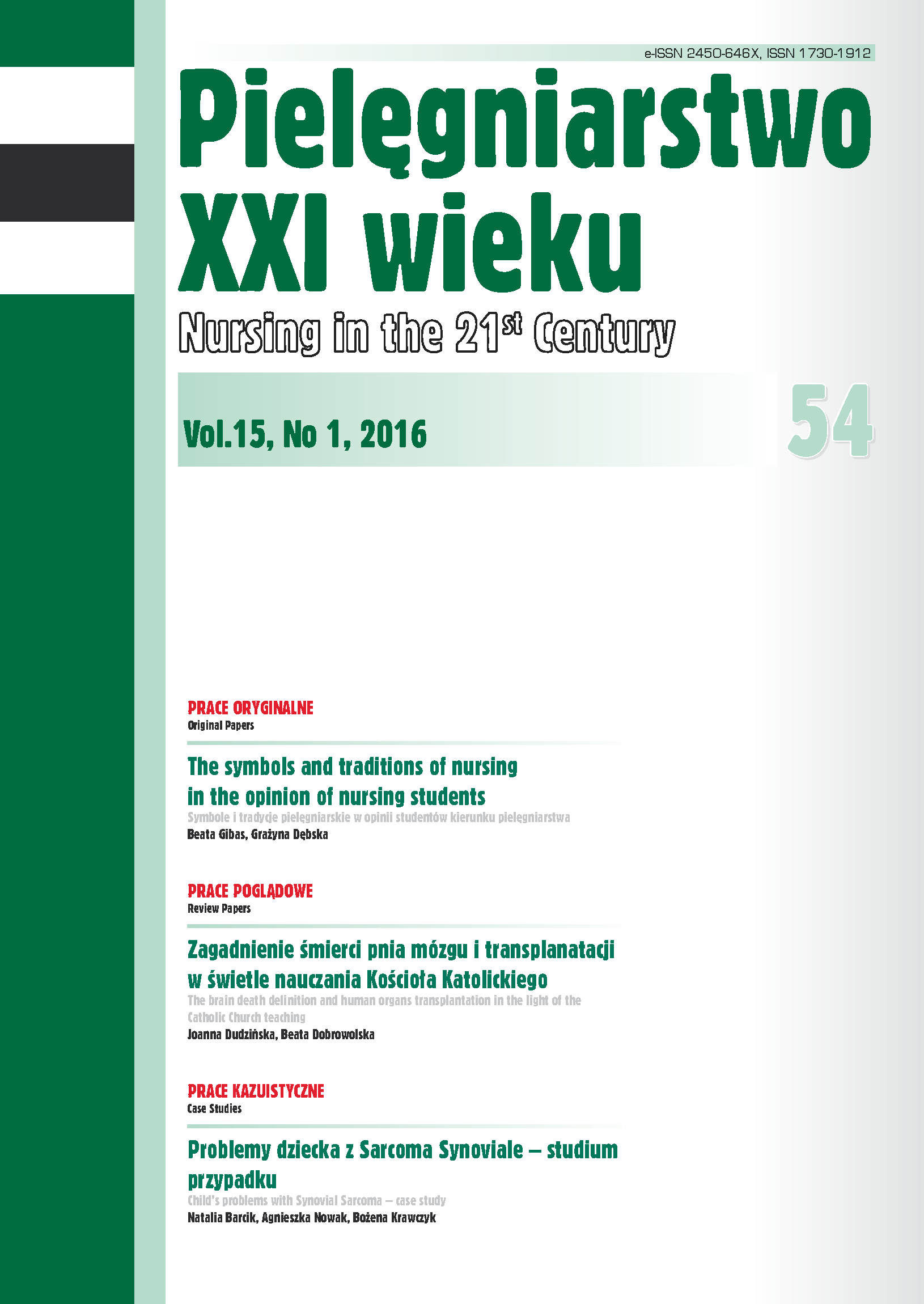The importance of specialization training and opportunities to utilize the qualifications of specialists in long-term care nursing to improve the quality of nursing care of chronically and terminally ill patients
DOI:
https://doi.org/10.1515/pielxxiw-2016-0002Keywords:
specialists, long-term care nursingAbstract
THE IMPORTANCE OF SPECIALIZATION TRAINING AND OPPORTUNITIES TO UTILIZE THE QUALIFICATIONS OF SPECIALISTS IN LONG-TERM CARE NURSING TO IMPROVE THE QUALITY OF NURSING CARE OF CHRONICALLY AND TERMINALLY ILL PATIENTS
Aim of the Study. To analyse the usefulness of specialization training in the area of long-term care nursing as well as the possibilities to make use of the acquired qualifications – in the opinion of the specialists in this area.
Material and Methodology. The questionnaire survey was conducted among 162 specialists in long-term care nursing.
Results. The majority of respondents considered the specialization training as useful (91.4%) and meeting their expectations (83.9%). As the result of obtained specialization, they perform their work with patients better (67.9%), demonstrate expertise and proficiency as well as high degree of efficiency (67.3%). Some of them exercise their right to independent provision of healthcare services, predominantly the assessment of the patient’s level of consciousness with the use of methods and classifications (75.7%), physical examination (61.2%), oxygen therapy (55.3%), and definitely less often – referral to diagnostic tests (20.4%).
Conclusions. Completion of a specialization training in the area of long-term care nursing brings satisfaction and professional prestige to specialists, results in increased professional independence and improvement in the quality of provided care. However, high qualifications of this professional group are underutilized.
References
1. Dz.U. Nr 174, poz. 1039 z późn. zm.).
2. Rozporządzenie Ministra Zdrowia z dnia 22 listopada 2013r. w sprawie świadczeń gwarantowanych z zakresu świadczeń pielęgnacyjnych i opiekuńczych w ramach opieki długoterminowej (Dz. U. z 2013 r. poz.1480).
3. Rozporządzenie Ministra Zdrowia z dnia 7 listopada 2007r. w sprawie rodzaju i zakresu świadczeń zapobiegawczych, diagnostycznych, leczniczych i rehabilitacyjnych udzielanych przez pielęgniarkę albo położną samodzielnie, bez zlecenia lekarskiego (Dz. U. Nr 210, poz. 1540).
4. Bielawska J. Kompetencje zawodowe pielęgniarki. Legnica: Zeszyty Naukowe Państwowej Wyższej Szkoły Zawodowej im. Witelona. 2012;8: 5-15.
5. Opolski K, Dykowska G, Możdżonek M. Zarządzanie przez jakość w usługach zdrowotnych. Warszawa: Wydawnictwo CeDeWu; 2005.
6. Armstrong M. Zarządzanie ludźmi. Praktyczny przewodnik dla menedżerów liniowych. Poznań: Dom Wydawniczy Rebis; 2007.
7. Chmielewska E. Wpływ czynników motywujących na kształcenie podyplomowe pielęgniarek w Wojewódzkim Szpitalu Specjalistycznym w Legnicy. Legnica: Zeszyty Naukowe Państwowej Wyższej Szkoły Zawodowej im. Witelona. 2012;8:19-32.
8. Głowacka, M., Haor B, Ślusarz R, i wsp. Zainteresowanie pielęgniarek kształceniem ustawicznym. Problemy Pielęgniarstwa 2014; 22(2):271-275.
Published
Issue
Section
License
Copyright (c) 2016 Authors

This work is licensed under a Creative Commons Attribution-NonCommercial-NoDerivatives 3.0 Unported License.




